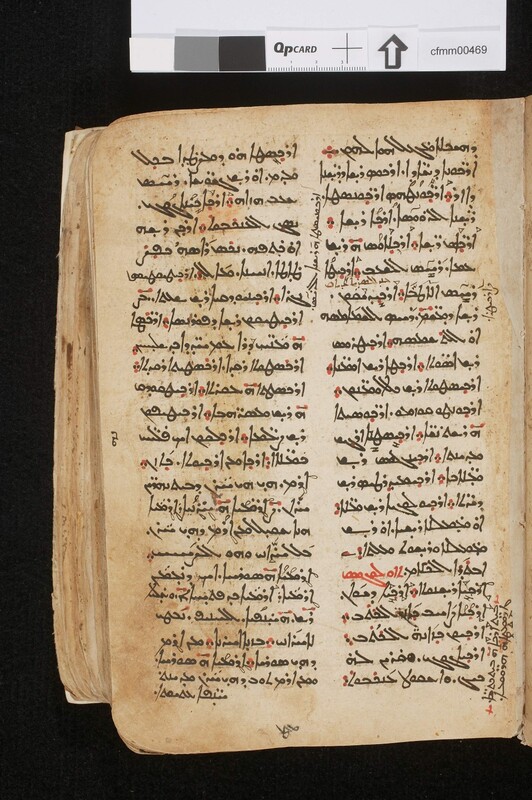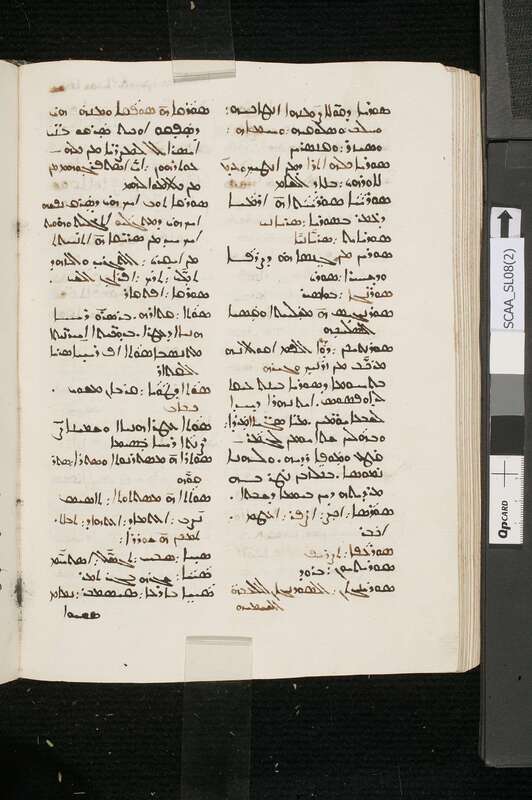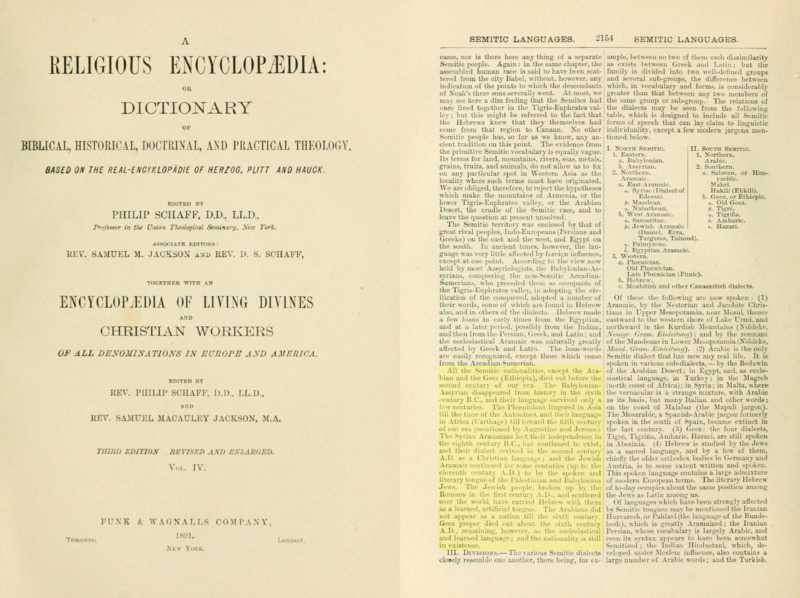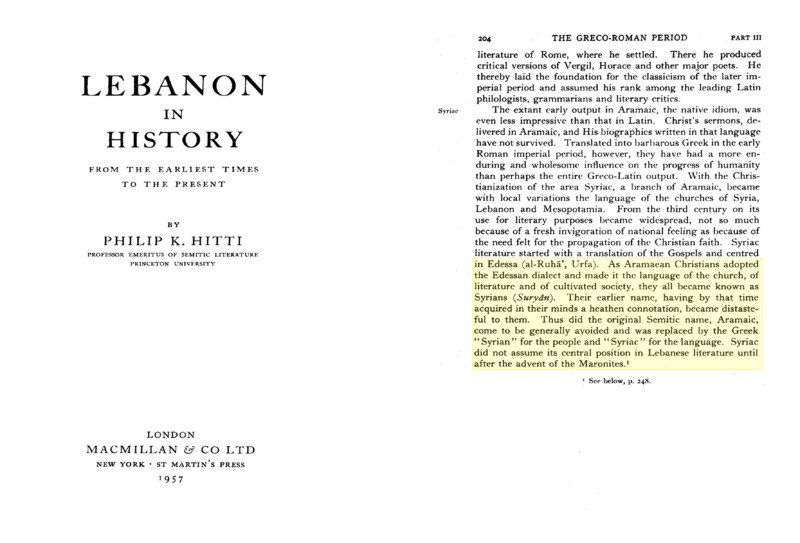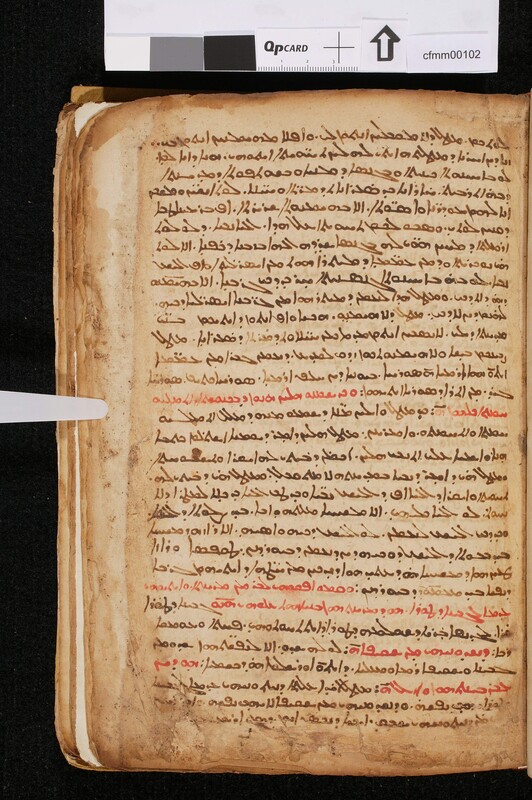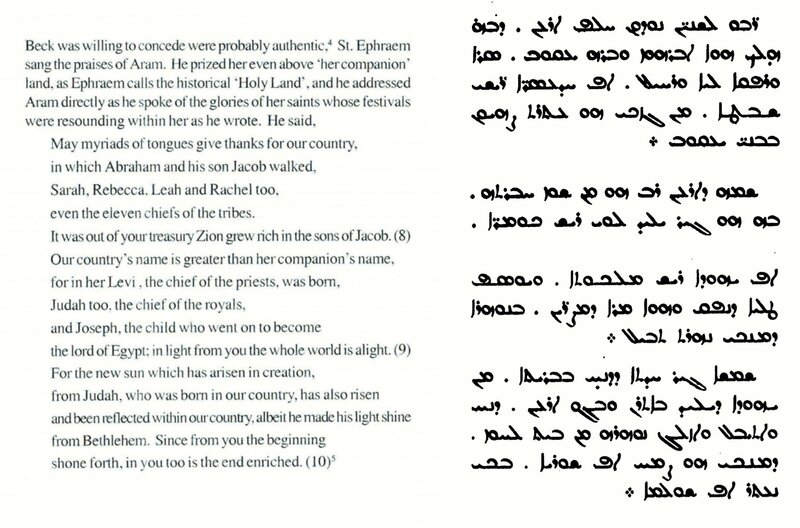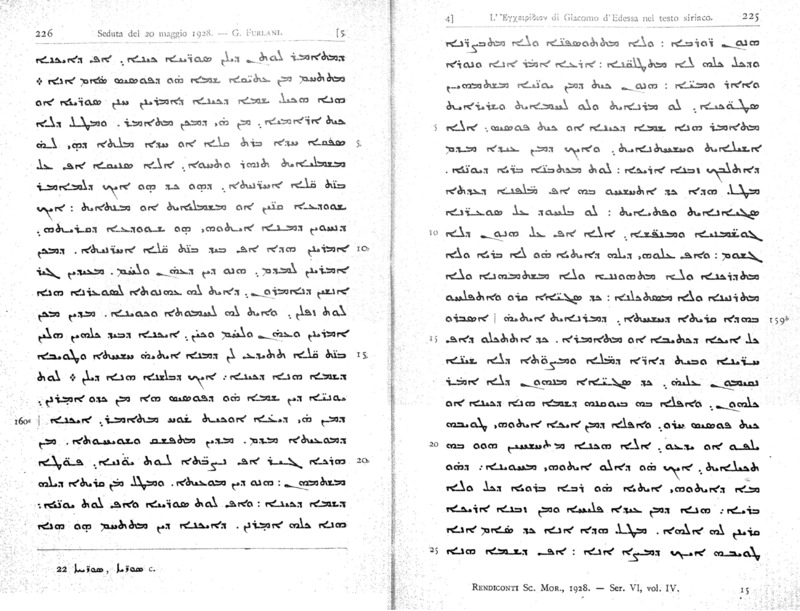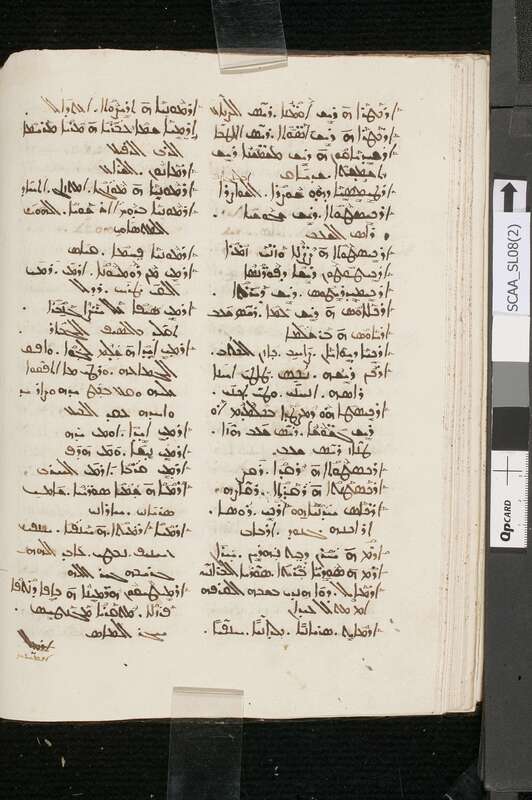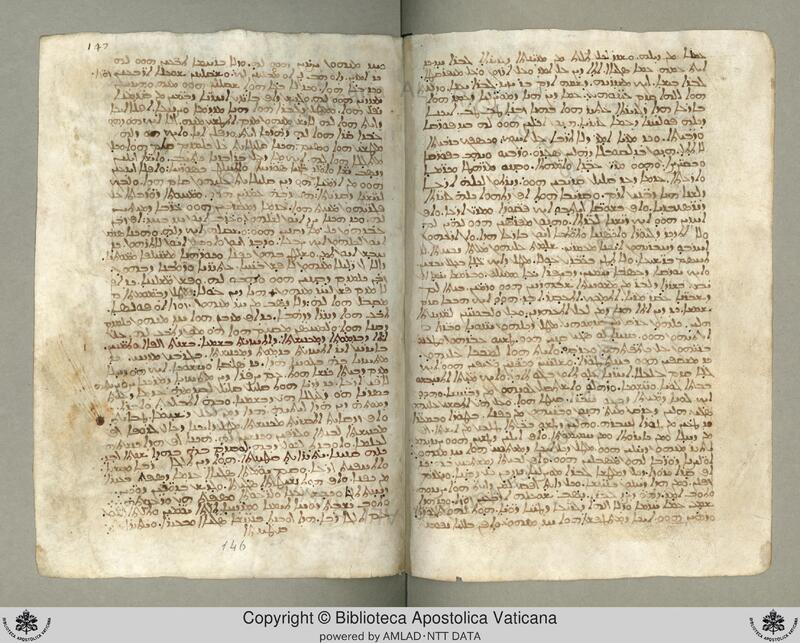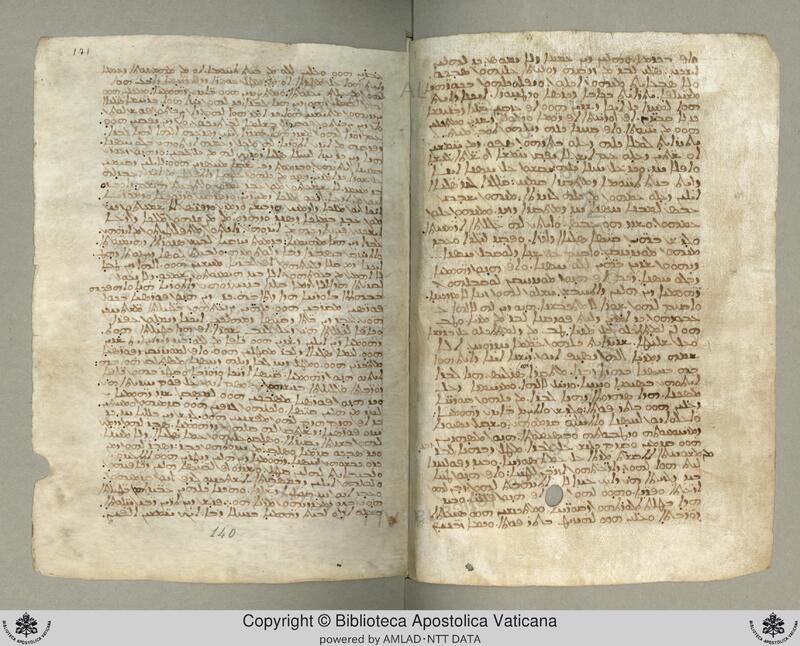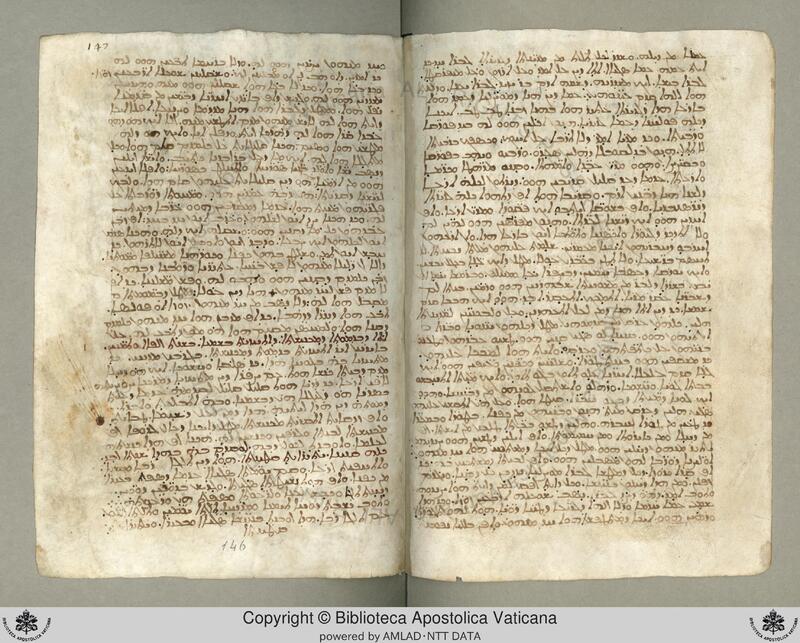CONTINUITY
Lexicon of Isho Bar Ali
In his lexicon, Isho Bar Ali, a 9th century member of the Church of the East, gave definitions of the terms Syriac and Aramean; here is a corrected translation, with clean punctuation:
“Aram is Haran in Mesopotamia.
Arameans are the Syrians, as Naaman was an Aramean.
‘Oromoyo’ (Aramean), when the resh (ܪ) is open (Ormoyo), means a worshipper of idols, a pagan; ‘Nabataean’ in another sense.
In another sense, from Aram, which is Syria, ‘Oromoyo’ is ‘Suryoyo’ (Syriac); and again from Aram, which is Haran, the ancient city of idolaters.”
“Ormoyo” (ܐܳܪܡܳܝܳܐ) in Syriac can denote a pagan by pronunciation and context, specifically when a vowel is missing or the resh is read “open,” yielding a form like ܐܳܪܡܳܝܳܐ instead of ܐܳܪܳܡܳܝܳܐ. Bar ʿAli carefully distinguishes Aramean from pagan on the basis of that vowel; the former is an ethnonym, the latter a religious label that can arise from pronunciation. He even adds that in another sense the word can mean Nabataean.
Isho Bar Ali also equates Aram with Upper Mesopotamia concentrated around Harran, which he identifies with Paddan-Aram (“the field of Aram”) in the Bible. Harran lies just below Urhoy (Edessa), about 206 kilometers west of Mardin and the Tur Abdin region. This reflects a geographical understanding of Aram as the northern Mesopotamian plain that served as the heartland of the ancient Arameans.
He then closes by defining Aram as Syria in the Greek rendering, which explains how Aramean (Ormoyo) yields Syriac (Suryoyo). Finally, he returns to his first regional definition, identifying Aram with the Harran-centered zone of Upper Mesopotamia.
In summary, Isho Bar Ali teaches that Aramean means Syriac, irrespective of location, because Aram came to be rendered as Syria/Syriac in Greek. At the same time, he defines Aram geographically as the region of Upper Mesopotamia concentrated around Harran, the ancient “field of Aram.”
Bar Bahlul's Definition of Syria
Bar Bahlul says that "Syria includes Antioch, Aleppo, Seleucia (the port al-Suwaydiyya near Antioch), Hama, Shaizar, and Qinnasrin." He further says that "Syria is all the country from Antioch to Edessa, Bilad al-Sham."
The Outline Of History
The author highlights the fact that the names Assyrian and Syrian has no connection to each other. It only happened that there is an accidental similarity between the two terms. The author also supports the notion that the modern day Syrians/Syriacs are descendants of the Arameans
A Religious Encyclopedia
Philip Schaff (ed.) in A Religious Encyclopædia (1891), article “Semitic Languages,” states that “the Babylonian-Assyrian disappeared from history in the sixth century B.C., and their language survived only a few centuries,” whereas “the Syriac-Arameans lost their independence in the eighth century B.C., but continued to exist, and their dialect revived in the second century A.D. as a Christian language; and the Jewish Aramaic continued for some centuries (up to the eleventh century A.D.) to be the spoken and literary tongue of the Palestinian and Babylonian Jews.” In other words, as Schaff’s encyclopedia writes, the Assyrian-Babylonian tradition faded early as a historical nationality and language, while the Arameans lived on through enduring Christian and Jewish Aramaic traditions.
Lebanon In History
Philip K. Hitti writes that early Aramean Christians adopted the Edessan Syriac dialect for church, literature, and cultured life. Over time they came to be known as “Syrians” (Suryani), while their earlier name “Aramean” fell from use because it had gained a pagan connotation. In this usage, “Syrian” referred to the people and “Syriac” to the language, which later took a central place in Lebanese literature with the rise of the Maronites.
Moses bar Kepho’s Commentary on Luke: A Ninth Century Apology
"It is necessary to know that Naaman was a man from among the nations, an Aramean, that is, Syrian; and in the Greek (version), instead of Aramean it is written Syrian."
Hymns on Abraham Kidunaya and Julianos Saba
Saint Ephrem the Syrian sang the praises of Aram. He prized her even above ‘her companion’ land, as Ephraem calls the historical ‘Holy Land’, and he addressed Aram directly as he spoke of the glories of her saints whose festivals were resounding within her as he wrote. He said,
"May myriads of tongues give thanks for our country,
in which Abraham and his son Jacob walked,
Sarah, Rebecca, Leah and Rachel too,
even the eleven chiefs of the tribes.
It was out of your treasury Zion grew rich in the sons of Jacob.
Our country’s name is greater than her companion’s name,
for in her Levi, the chief of the priests, was born,
Judah too, the chief of the royals,
and Joseph, the child who went on to become
the lord of Egypt; in light from you the whole world is alight.
For the new sun which has arisen in creation,
from Judah, who was born in our country, has also risen
and been reflected within our country, albeit he made his light shine from Bethlehem. Since from you the beginning
shone forth, in you too is the end enriched."
Enchiridion on Various and Necessary Matters Concerning Nature
About the term "nature," Mor Jacob of Edessa mentions his people being Syriac-Arameans:
“So then, this noun kyōnō, as we Syrians—that is, Arameans—express it, is derived from [the word meaning] “natural/capable” (m’eḳan). And because a single term or word does not suffice to elucidate and explain it thoroughly, but [rather] one must make use of further expressions that have, so to speak, the same meaning, either wholly or in part, [for this reason] we shall express it also by means of [some] other terms, in order to demonstrate just what the meaning of the expression is. We say of something that it is m’eḳan to mean that it is appropriate or well-adapted. People customarily say that something has a certain appropriateness in some way or other, and is well-adapted and properly constituted (kuyyōnō). So let us define meḳan as [meaning] appropriate, well-adapted and properly constituted (kīn), such that by means of all of these terms, we may discover what is the usage and the etymology of this word kyōnō, insofar as it is [used] in our language.”
Bar Bahlul's dictionary
“Aramean (Oromoyo): a Syrian from Sham.
Armaya: a pagan.
As we can see, there is a difference between Armaya and Aramaya (Aramean and Syrian).
About Arab Muslims Who Married Christian Syrian Women
"Because this man was so cunning and crafty, no place in which someone hid any object escaped his attention, as if that very object had been calling him, saying: “Here I am! I belong to so and so!” He was aware of everything as quickly as the one who hid or put away an object, and everything was revealed to him, as is written about the Son of Perdition. As for the people who married (Syrian) women, sired Syrian children, and mixed with the Syrians, and whom no one was able to distinguish from the Aramaeans, he quickly found out about them."
In 769–770 CE, the Abbasid governor’s agents hunted down fugitives from Mosul hiding in villages across the Jazira. Some were Muslim Arabs who had married local Christian women, fathered children, and lived among the Syriac-speaking Christian population so long that they were outwardly indistinguishable from the Aramaeans (here meaning Syrians). Despite this, the governor identified them, seized them, and confiscated their property.
Amir Harrak notes: Aramaeans here is synonymous with Syrians (Syriac-speaking Christians; see the note on p. 225 n. 1 above). The men in question may have been Muslim Arabs who had married Christian women.
Saved from the Hands of the Assyrians
"Often they used to cross over and penetrate inside the borders, either because of the negligence of the agent in charge of the guard, or because of the tithe which was mercilessly imposed on them out of greed, and used to be captured and brought into Qamh by the Romans. When the man in question would see them, he treated them with a great deal of compassion, saying: “If you want, stay with us, or if you want, leave and go home in peace.” But if they left, he would send along provisions for them. Truly, my brothers, God has rewarded this man in that he saved him, together with all the people who were with him inside the fortress, from the hands of the Assyrians […] they heard: ‘He will not invade this town, but I will put a ring in the nose of this Assyrian and I will cause him to return with shame by the way in which he came.’ The Persians were fighting with all means, yet their tricks failed. They built mobile wooden houses to fill the ravine beside the city wall, but the Romans destroyed them. One night, thinking the defenders were asleep, countless Persians tried to climb the walls, shouting “Allahu Akbar,” but the Romans struck them down, piling their corpses in heaps. Thus all their efforts proved futile, for the helper of the Romans was the Lord."
In 769–770 CE, a massive multi-ethnic Abbasid army under ‘Abbas (brother of the Caliph) besieged the Byzantine fortress of Qamh. The chronicler describes the army’s diverse pagan and Muslim elements, their sins, and the heavy burden Arab rule placed on the local Syrian (Aramean) villagers. The Roman commander, Sergius, treated captured villagers with compassion. During the siege, the enemy taunted the defenders with boasts about past victories over many kings and lands. Despite being heavily outnumbered, Sergius and his men relied on prayer and faith, eventually repelling the attackers.
“Assyrian” is a figurative label for the Arab Muslim besiegers.
Seizing the Land of the Children of Aram
"At this time the people of Mosul, who lived in this region of the Jazira, were exceedingly rich, in such a manner that they were devouring all the output of the people of the Jazira through forfeit and usury. Though the Lord said: Do not lend money to your brother on interest, and do not give your money with usury, they did the opposite. They lent on interest and gave their money at forfeit and with usury. They became owners of slaves and maidens, and possessed properties, vineyards, and lands, in such a manner that soon they were close to owning the entire land which spoke the language of the children of Aram, and the whole Jazira was near to becoming the property of the Narsabadians."
Wealthy outsiders from Mosul, the Narsabadians, used debt and usury to seize land in the Jazira, coming close to owning the entire “land which spoke the language of the children of Aram” — the native Syriac-speaking Christian population whose land was being taken.
ܐܪܥܐ ܕܠܫܢܐ ܕܒܢܝ ܐܪܡ: Northern Syria, the Jazira of the Arab sources, had been the homeland of the Aramaeans since the late second millennium B.C. Syriacspeaking people were the descendants of these Aramaeans, as the expression above indicates.*

